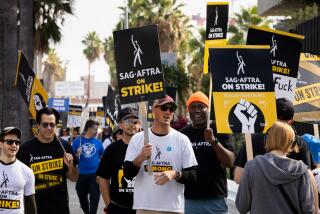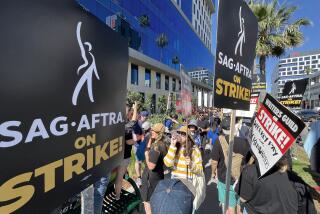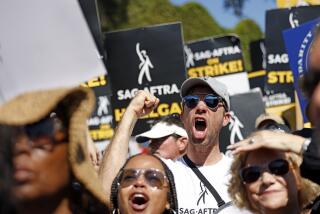Sandinista Unions Agree to End Strike : Nicaragua: The government yields on talks. Public employees win a pay boost.
- Share via
MANAGUA, Nicaragua — After backing down from its refusal to negotiate under pressure, the government signed its first accord on wage increases and job security with Sandinista unions Wednesday night, ending Nicaragua’s most disruptive strike in 11 years.
The agreement, which set a precedent for indexing wages to inflation, will double this month’s paychecks for public employees and raise their June wages by the same percentage that 53 basic consumer items go up in price during the last 24 days of May.
It also gives unions the right to help make rules for applying a civil service law that President Violeta Barrios de Chamorro suspended last week and wanted to modify unilaterally. The unions’ role could limit her authority to dismiss Sandinista holdovers from senior posts in the bureaucracy.
Union leaders also won a government promise to rehire any worker fired for taking part in the six-day strike and to refrain from dismissing anyone while the civil service law is being defined.
Both sides hailed the accord as a landmark settlement of a bitter labor dispute--Chamorro’s first major political challenge since the April 25 inauguration of her center-right government ended a decade of Sandinista rule.
“Starting tomorrow, Nicaragua begins to construct a democracy, leaving behind an era of confrontation,” said government negotiator Francisco Mayorga, president of the central bank. “We have opened a channel between the workers and the government and discovered that what unites us is more important than what divides us.”
The government gave ground to the powerful Sandinista unions on nearly every point of the accord. Workers won an additional 25% wage increase on top of the 60% offered by the government--a compounded raise of almost half of the 200% increase they had demanded. Menial government jobs pay the equivalent of about $15 a month, while public employees with some technical skill earn at least $65.
“We didn’t get everything we wanted, but we set a precedent that, from now on, nothing can be done to the economy without the active participation of the workers,” said Lucio Jimenez, the chief labor negotiator. “This is the essence of the democracy we’ve learned in 10 years of revolution.”
Beleaguered by the strike, Chamorro had sent her labor minister and other top aides to restart the talks after public employees defied a back-to-work order Tuesday by shutting down the international airport and the telephone system, isolating a country in which government offices, banks, schools, bus lines and railroads were already closed.
After the talks made progress Wednesday morning, union leaders restored telephone service, allowed rail shipments of crude oil to refineries and released a shipment of medicine held up by striking customs agents at Managua’s Augusto Sandino Airport.
The accord, announced at 8 p.m. after 16 hours of talks between the government and eight union leaders, obliges 50,000 strikers to return to work this morning.
The return of the government to the bargaining table, after it declared the strike illegal Monday and threatened to fire the strikers, was an acknowledgement of the Sandinistas’ ability to paralyze the country. Mayorga said the strike had cost the treasury $10 million.
“If we had stuck to the law we would never have settled anything,” Labor Minister Francisco Rosales admitted. “Firing workers, hiring others . . . would not have resolved the problem. This moment in our history demanded a political response.”
The strike was the most disruptive in Nicaragua since 1979, when workers, often supported by their employers, paralyzed the country several times in a popular uprising against dictator Anastasio Somoza. After deposing Somoza in July that year, the Sandinista guerrillas took control of the labor movement and used force to discourage strikes.
Chamorro, who routed Sandinista President Daniel Ortega in the Feb. 25 elections, inherited what she called a bankrupt economy and a power structure built by the Sandinistas, whose supporters retain key positions in the government bureaucracy, the army, the police and the courts.
Ordered by the government to reopen strike-closed offices with minimal violence, riot police retreated Tuesday from showdowns with aggressive Sandinista pickets at the Foreign Ministry, the central bank and the National Palace, and have made no further moves to clear them.
In another setback for the government, the Sandinista-dominated appeals court in Managua ruled Wednesday that the strike was legal.
A Chamorro aide said that the 60-year-old president, who did not joined the negotiations herself, was eager to resolve the crisis. The aide said a prolonged social conflict could have slowed the pace of disarmament by the Contras and the reduction of the Sandinista-led army under a peace accord that was Chamorro’s first achievement in office.
More to Read
Sign up for Essential California
The most important California stories and recommendations in your inbox every morning.
You may occasionally receive promotional content from the Los Angeles Times.













